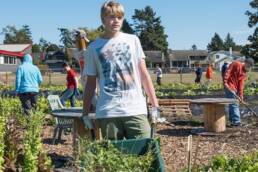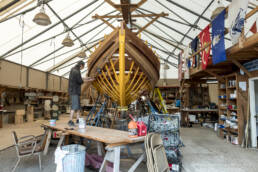Along the fertile banks of the Fraser River, kids are learning society’s rite to grow. By Lisa Richardson.
Some educators finally clued in to the fact that working the land offers some of the best know-how there is. And it’s earning them awards for innovation in education.
Delta’s Farm Roots Mini School, recipients of the Ken Spencer Award for Innovation in Teaching and Learning, is the first program of its kind in British Columbia. Farm Roots is available to any grade 10–12 students in the Delta School District’s seven high schools with a yen for hands-on learning. Students attend “classes” at an eight-acre farm campus every other day of the week, gaining credits for science, social science, business, marketing, biology and other courses from their work building and running a farm.
Fifty students have taken their studies out of the classroom in the program’s first two years, using the farm platform to explore social media marketing, soil science or the future of insects as a source of protein to solve world hunger. The farm campus, which boasts over half an acre in crops, an orchard and bees, is in a region that produces over half of the province’s green beans and potatoes and 90 per cent of its tomatoes.
Brooke Moore, the district’s principal of inquiry and innovation, had been looking for a way to fold agriculture into the curriculum for some time. The more she learned about sustainable agriculture and food security, the more invested she grew in preparing youth to tackle the coming environmental crisis in a hands-on, multidisciplinary way. “It’s so urgently necessary,” she says.
While others might future-proof the next generation by teaching them coding, 3D printing, engineering robots or tech, Farm Roots Mini School is a reminder that in any future scenario, dystopic or otherwise, we’re all going to need to eat. And the most prepared might be the ones willing to roll up their sleeves and get creative and dirty.
Lisa Richardson
Lisa is a lifestyle and ski journalist. She has contributed to a host of publications and outlets including an anthology of ski-writing Skiing The Edge, CBC radio, Pique newsmagazine, www.thetyee.ca, the Vancouver Sun, the National Post, Whistler the Magazine, SBC Skier, Freeskier and The Ski Journal.
Related Stories
How One Man Survived Residential School To Become A Professional Skateboarder
The New Yorker has published a short documentary about Joe Buffalo, a Canadian Cree and professional skateboarder who…
Of Vessels & Veritas At The Northwest School of Wooden Boatbuilding
The teachers at this esteemed Olympic Peninsula institution know that while owning a boat will change your life,…
Honest Review: Farm To Feet Merino Socks
These socks are made in America. And like their country of birth, they're powerful as hell. Managing editor Vince…
Is This The Coolest School Bus In The Pacific Northwest?
Louisa Gilbert of Wild Bus Films has turned a simple yellow school bus into an off-grid travelling palace. This is…
Stout Fans, Rejoice.
Not sure about you, but in winter we get thirsty for darker, stronger beers. Stoked to see our friends at Tree Brewing…







